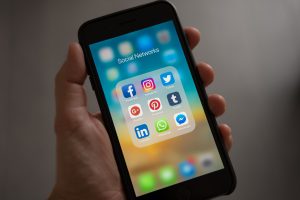My husband Bernard and I just returned from a fabulous babymoon in sunny California. It was a wonderful getaway, we saw and did a lot, laughed frequently and enjoyed some quality time together before our son arrives.
I could connect to the world via my cell phone throughout the trip, though there were some periods where I had no cell service. But, I found myself for long stretches of time not connecting to the world at all. We used my phone for directions, so while it was plugged into our car system, I was not using it – instead I spent a lot of the time looking out the window of our rented Ford Mustang, taking in the surroundings, and talking with my husband about various topics that would arise. It was awesome, and it got me thinking about the power of disconnecting from our ultra-connected world.
It is a well-known fact that our society is continuously connected, more so now than ever, and as technology evolves we will only become more connected. I think about this a lot because I am from the last generation that can recall life before cell phones. My son will not be able to say that, and I have been reading about how to raise a child in an overly connected, technological world.
In researching for this piece, I found a number of negative impacts related to an overly connected lifestyle.
- Being connected continuously can bring about negative feelings of jealousy, envy, and loneliness. Negative feelings and discontentment often arise when browsing others’ social media profiles and comparing their perceived lives to one’s own.
- Spending so much time engrossed in technology can take away from personal relationships and diminish social skills. You become so focused on a screen that you forget to look up, make eye-contact, engage, and observe the people and places around you.
- Over-indulging in technology can cause issues with sleeping as well as body pains from straining your neck, back, and eyes. It also can have adverse effects on your ability to retain information, your overall mood, and your ability to be productive.
Most of this information is not new or surprising. It is a topic that is frequently discussed and talked about because technology and connection are always present now in our lives. However, this past week I recognized something – I was happier, more content, present, and reflective because I was removed from the screen.
At one point, Bernard and I were directed to go down a road that was closed, so we veered onto another way where we lost service. We drove on this road for almost an hour without any connection, just us and the gorgeous wide-open road. If we had had service, I would have had my face in my phone looking up directions and missed the beautiful views. Bernard and I wouldn’t have shared the laughs or the conversation, and it was an experience of which you had to be present, happening in real time, unable to be repeated or replicated.
It is not that I feel addicted to my phone, but it is there and readily available. It is so easy to hop on social media and start scrolling through your feed, or read a news article, or send someone a text or snap. But I do recognize that I tend to jump on those outlets quite a lot, especially in situations where I feel uncomfortable, awkward or bored. I strongly feel that I need to be more conscious of this going forward and work on healthier behaviors and habits when it comes to technology and connecting with others, mainly because soon I will have a little man watching my every move.
I felt so great about disconnecting last week that I began thinking about how I can develop healthier behaviors and habits going forward. Here is what I came up with:
- I post my blog on social media so removing it from my life entirely might be a little difficult plus on some level I do enjoy seeing what people are up to, but on the weeks when I am not posting I am going to try and detox. No social media, no getting lost in scrolling, etc.
- The weeks that I am posting, limiting my time on social media and my phone in general. No phone after nine at night, no phone when in social situations, and no phone out during meals (Bernard and I already actively do this but every now and again we slip up so for safe measure it’s going on to my list).
- On the weekends, I will try to sit around less. If I am sitting around instead of looking at my phone, I will read a book or do an activity. Also, putting my phone out of sight will help. The saying goes, out of sight, out of mind and I have found when I don’t see my phone, I don’t feel compelled to be on it.
- Don’t feel obligated to respond to every single text message right away. I typically get a text and immediately respond because I think that if I don’t, I will forget. Bernard also never answers his phone, and it has become this joke that to get ahold of him you must go through me, so I feel an added pressure to respond in situations where he is included because I know he won’t or at least not in a timely fashion. The thing is, I don’t need to respond right away and to put that pressure on myself to continually be available can be draining, so practicing responding less urgently to every single text is another habit I need to develop.
Disconnecting can have a powerful effect on your well-being, my hope is implementing these behaviors and habits now will bring me into the present moment more, and help me to teach my son how to connect and use technology in a positive way.

